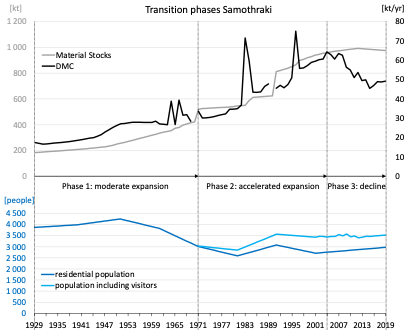The role of material stocks and livestock in shaping the sociometabolic transition of the past, present and future on the Greek island Samothraki
Doctoral thesis by Dominik Noll
This doctoral thesis is empirically capturing effects of the global sociometabolic transition of the past 100 years on the socioecological system of a small Greek island. By applying the conceptual framework of socioeconomic metabolism (SEM) to the local island level, it is possible to reconstruct the biophysical economy for the island Samothraki from 1929 – 2019. The 5 texts contained in this cumulative thesis are dedicated to achieving an academic goal while at the same time contributing to a transdisciplinary process on the local level. This thesis aims at advancing the field of sociometabolic research by providing a systematic assessment of material use, dynamics of biophysical stocks and material output in terms of waste and emissions over a timespan of 90 years in a mass balanced way. Beyond this empirical core, all texts are directed towards an assessment of key environmental pressures, their underlying socioeconomic drivers, and recommendations for the long-term reduction of these pressures. With the data presented it is possible to empirically show, on an island level, the transition from a mainly agrarian sociometabolic regime towards one that largely resembles modern industrialized societies.

The sociometabolic transition on Samothraki unfolded in 3 distinct phases: a phase of moderate expansion of SEM levels prior to 1970, followed by 3 decades of accelerated expansion, and a phase of decline to current levels thereafter. While Samothraki’s population numbers declined by one third between 1929 and 2019, the island’s material stocks expanded 5-fold and livestock units 2-fold. This expansion is also reflected in the island’s increasing use of, often imported, materials and the domestic accumulation of waste. The transformation from traditional to modern building techniques in combination with the expansion of material stocks creates legacies that will shape the island for decades and centuries to come. The increase in livestock units resulted in decades of overgrazing, triggering erosion that will be visible in the island’s landscape for decades to come.
Once based on a circular economy that was built upon locally available materials and exclusively biomass for energetic purposes, the island’s population imports 50% of their food and 100% of their other used materials today. The sociometabolic assessment enables the definition of potentials for a long-term reduction of the island’s unsustainable material use patterns and non-renewable waste generation. The final part of this thesis reflects upon the role of science and the significance of sociometabolic research for supporting transdisciplinary processes fostering a sustainability transition on a local level.
Published articles as part of the cumulative doctoral thesis:
Noll, Dominik, Christian Lauk, Willi Haas, Simron Jit Singh, Panos Petridis, and Dominik Wiedenhofer. 2021. “The Sociometabolic Transition of a Small Greek Island: Assessing Stock Dynamics, Resource Flows, and Material Circularity from 1929 to 2019.” Journal of Industrial Ecology, 1–15. https://doi.org/10.1111/jiec.13206.
Noll, Dominik, Christian Lauk, Veronika Gaube, and Dominik Wiedenhofer. 2020. “Caught in a Deadlock: Small Ruminant Farming on the Greek Island of Samothrace. The Importance of Regional Contexts for Effective EU Agricultural Policies.” Sustainability 12 (3): 762. https://doi.org/10.3390/su12030762.
Noll, Dominik, Dominik Wiedenhofer, Alessio Miatto, and Simron Jit Singh. 2019. “The Expansion of the Built Environment, Waste Generation and EU Recycling Targets on Samothraki, Greece: An Island’s Dilemma.” Resources, Conservation and Recycling 150 (November): 104405. https://doi.org/10.1016/j.resconrec.2019.104405.
Fetzel, Tamara, Panos Petridis, Dominik Noll, Simron Jit Singh, and Marina Fischer-Kowalski. 2018. “Reaching a Socio-Ecological Tipping Point: Overgrazing on the Greek Island of Samothraki and the Role of European Agricultural Policies.” Land Use Policy 76 (July): 21–28. https://doi.org/10.1016/j.landusepol.2018.04.042.
Petridis, Panos, Simron Jit Singh, Marina Fischer-Kowalski, and Dominik Noll. 2017. “The Role of Science in Sustainability Transitions: Citizen Science, Transformative Research, and Experiences from Samothraki Island, Greece.” Island Studies Journal, no. Vol. 12: 115–34.
